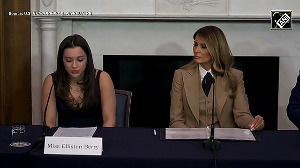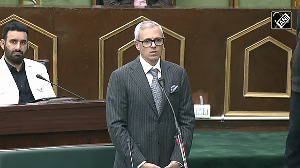"It is possible for a dragon and an elephant to be on good terms with each other. And that is the current case with China and India," the state-run China Daily said in an article on its opinion page.
Wen, on his first visit to India, reached a consensus with his host on keeping the issue of border disputes on the backburner, the leading English-language newspaper noted even as Wen is slated to hold talks with Indian leadership today.
India, China to sign agreement on boundary issue
"They have decided to reinforce the pragmatic co-operation path that the two countries have embarked on," it said, commenting that Wen's India visit, an important part of his South Asia tour, is expected to drive forward the 55-year modern relationship between the two countries.
However, the paper said the Sino-Indian border disputes remain unsettled. But they will not become a drag on the progress of their relations. While working out a mechanism for a peaceful settlement of the issue, the two countries realise there is much to be gained by co-operation, and by expanding commerce and trade relations.
"Big does not necessarily mean rivalry. There are a lot of things that bring us together. Both of us prefer a world order that is more multipolar and takes greater account of our roles. The Chinese are no stranger to their neighbour's Bollywood movies and curries," it said.
"We have always looked on our big neighbour on the other side of the Himalayas as our partner. We are happy to read the same message from them," the paper said.
"People of the two countries have been getting to know each other better, which helps build trust. This lays a solid foundation for healthy progress in bilateral relations and more co-operation," China Daily said in the article.
"The warm ties are going to bring concrete results. China and India are to open a free trade zone, an initiative China proposed to India when State Councillor Tang Jiaxuan visited the country last October," it said.
Efforts will be taken to reduce areas of friction between the two countries, such as establishing a co-ordination mechanism to avoid hostile competition over energy.
There is no doubt that trade is the engine driving Sino-Indian relations forward. However, there is a lot to be desired with the two countries' trade links. Bilateral trade stood at 13.6 billion US dollars in 2004. That is only 1 per cent of China's global trade, and 9 per cent of India's. This indicates the huge opening for hard work from the two countries.
India, China plan world's largest Free Trade Area
China's new leadership has fine-tuned foreign policy for better getting along with our neighbours, considering them as our partners. The two countries' economic growth, and potential for faster development, have fuelled outsiders' curiosity concerning a race between the two.
But the two are not rivals on any front, including the political and economic. Progress in the two countries will consolidate the building blocks for further co-operation.
The ups and downs of bilateral relations over the past 55 years have offered a plethora of lessons for the two countries' leaders. They are building a more mature relationship based on rationality and pragmatism, the paper concluded.






 © 2025
© 2025